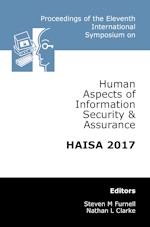In 2014, we launched our open-access repository which offers full text access to conference proceedings from many of our events including the INC and HAISA series. These papers are free to access and distribute (subject to citing the source).
» Openaccess proceedings » Eleventh International Symposium on Human Aspects of Information Security & Assurance (HAISA 2017)
 | Eleventh International Symposium on Human Aspects of Information Security & Assurance (HAISA 2017) |
Title: The Socio-Technical Impact on Security of the Healthcare Internet of Things in the Use of Personal Monitoring Devices (PMDs)
Author(s): Asanka I Pathirana, Patricia A H Williams
Reference: pp292-302
Keywords: Healthcare Internet of Things, personal monitoring devices, socio-technical security, human factors
Abstract: New healthcare technologies facilitate additional care pathways and opportunities for patients beyond that of traditional care. Patient care using the Healthcare Internet of Things (HIoT) such as regular fitness and blood pressure monitoring and storing the data for detailed analysis are one of these new pathways. Chronic disorders such as respiratory illness, physiological disorders, cardiovascular diseases, stroke, and diabetes have benefitted from using Personal Monitoring Devices (PMDs). In addition, the aged care and child care sectors consider regular monitoring of people vital, and individuals are using PMDs to learn more about their calories burned, diet, exercise regime and vital signs. However, there is an increasing concern for privacy and security of personal health information generated by PMDs, and users themselves contribute to leakage of information. Therefore, it is essential to educate users to interact safely and securely with the HIoT environment without introducing additional vulnerabilities and unnecessary risks to personal information. At present, there is insufficient attention paid to the socio-technical perspectives specific to HIoT. Further, there is no guidance for consumers on the human factors influencing secure PMD usage. A case study method was used to devise a framework to map mitigation techniques that could be applied to improve the security and privacy of information based on the human security factors of HIoT. The research identified the level of involvement of users in their personal security posture when using HIoT PMDs. This research may assist in educating people in secure information usage, and explore mechanisms to improve a secure user experience with such devices. Such research is important given the sensitive nature of health information.
Download count: 942
How to get this paper:


PDF copy of this paper is free to download. You may distribute this copy providing you cite this page as the source.
